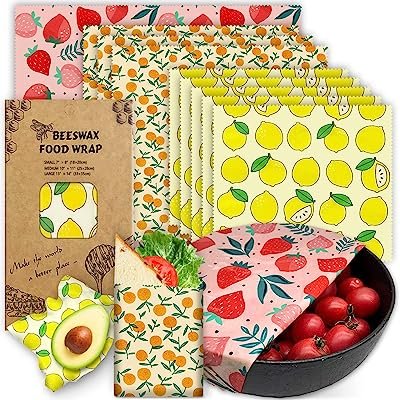Reusable food wraps are an eco-friendly alternative to single-use plastic wraps and bags for storing and covering food items. They are typically made from natural materials such as cotton, beeswax, jojoba oil, and tree resin. Here is a list of information about reusable food wraps, including their pros and cons, usage, and environmental impact:
Pros of Reusable Food Wraps:
- Environmentally friendly: Reusable food wraps help reduce plastic waste and the demand for single-use plastic products, which contribute to pollution and harm ecosystems.
- Sustainable materials: Most reusable food wraps are made from natural and biodegradable materials, making them a more sustainable choice.
- Versatility: They can be used to wrap various types of food, including fruits, vegetables, sandwiches, cheeses, and baked goods.
- Breathability: Unlike plastic wraps, reusable food wraps allow food to breathe, helping to maintain its freshness for longer periods.
- Customizable: Some reusable food wraps can be shaped and molded to fit different food items or containers, providing a versatile and customizable storage option.
- Washable and reusable: These wraps are designed to be washed and used repeatedly, reducing the need for constant repurchasing and saving money in the long run.
Cons of Reusable Food Wraps:
- Limited heat resistance: Reusable food wraps are not suitable for use in the microwave or oven due to the wax coating, which can melt at higher temperatures.
- Not airtight: While they provide some level of coverage, reusable food wraps may not create an airtight seal like plastic wraps or containers, potentially leading to some food drying out or losing its freshness more quickly.
- Durability: Over time, the wax coating on reusable food wraps can wear off, reducing their effectiveness. However, many wraps can be refreshed by applying additional wax or using a rejuvenating product.
Usage of Reusable Food Wraps:
- Mold and shape: Soften the wrap by warming it with your hands, allowing it to mold around the food or container you wish to cover.
- Secure the wrap: As the wrap cools, it will hold its shape, creating a seal.
- Cleaning: After use, wash the wrap with mild soap and cool water. Avoid using hot water, as it can remove the wax coating.
- Storage: Once clean and dry, fold or roll the wrap and store it in a cool and dry place until the next use.
Environmental Impact of Reusable Food Wraps:
- Reduces plastic waste: By using reusable food wraps, you can significantly reduce the amount of single-use plastic wraps and bags that end up in landfills or pollute the environment.
- Biodegradable materials: Many reusable food wraps are made from natural and biodegradable materials, which break down more easily compared to synthetic plastics, minimizing their impact on the environment.
- Energy and resource conservation: The production of reusable food wraps generally requires fewer resources and less energy compared to plastic wrap manufacturing, resulting in a lower carbon footprint.
It’s worth noting that the specific environmental impact and sustainability of reusable food wraps can vary depending on the manufacturing process, materials used, and proper end-of-life disposal. Choosing high-quality wraps from reputable brands and ensuring their proper care and disposal can further enhance their positive environmental impact. click on the link below to see reusable food wraps


Recent Comments